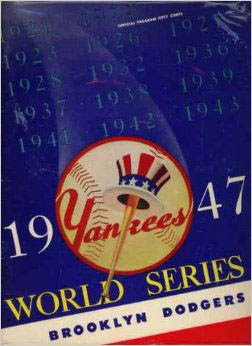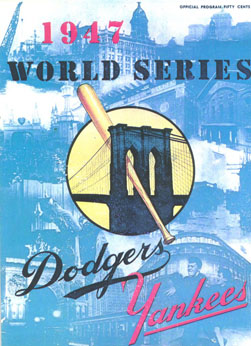1947 - Game 7: Brooklyn Dodgers @ New York Yankees
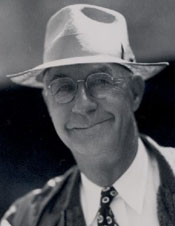
Dodgers manager Burt Shotton
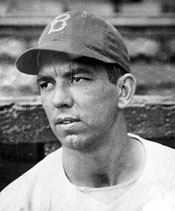
Bobby Bragan
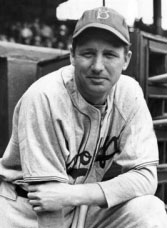
Dixie Walker
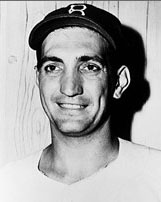
Ralph Branca
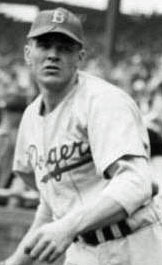
Joe Hatten
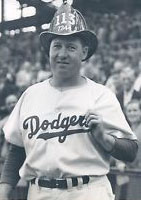
Hugh Casey
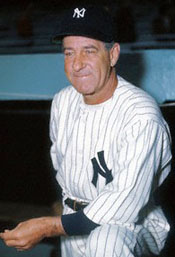
Bucky Harris
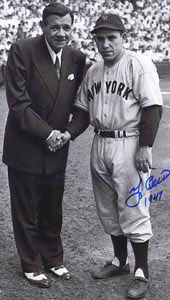
Babe Ruth with Yogi Berra at 1947 World Series
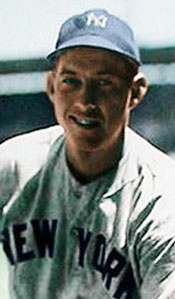
Sherman Lollar
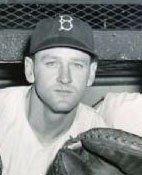
Dodgers C Bruce Edwards
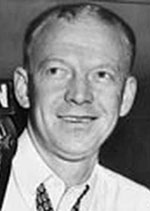
Red Barber
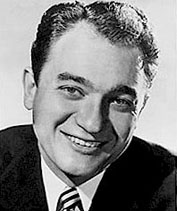
Mel Allen
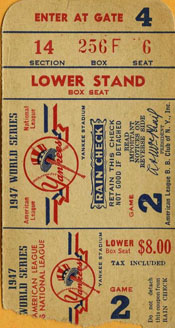
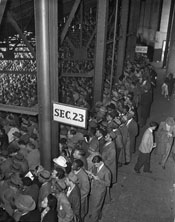
Standing room at Game One
of 1947 World Series
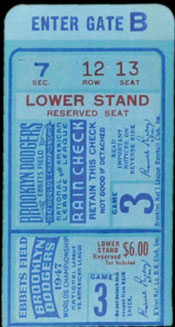
|
Pennant Races
The Brooklyn Dodgers faced not one but two sources of turmoil as the National League season began.
- First, General Manager Branch Rickey added Jackie Robinson to the club. The first African-American in modern baseball would surely face opposition and have to endure taunting from both opponents and fans. Jack would need his teammates' support early and often.
- Secondly, right before the regular season began, Commissioner Happy Chandler suspended Dodger manager Leo Durocher for the entire 1947 season because of contact with known gamblers.
- Rickey called on his old friend, 63-year-old Burt Shotton, to take the reins of the club. Like Connie Mack, Burt would manage from the dugout wearing street clothes and a Dodger jacket.
Brooklyn bullpen C Bobby Bragan, recalled: Shotton was in his sixties, a lovable old man. He was soft-spoken and fatherly where Leo had been much more outgoing and abrasive. The thing I remember most about Burt is that, after we'd lose a close game, the kind that hurt so much, he'd come back into the clubhouse and say, "There's always tomorrow." That was it. No shouting, no finger-pointing. It was just impossible to dislike Burt Shotton.
- Brooklyn set a National League record by drawing 1.8 million paying customers to Ebbets Field. Robinson was a big attraction, but the novelty of a black player would have worn off except for the fact that the Dodgers started 10-3 and stayed in the pennant race all season.
- Up ten games entering August, the Bums lost eight of eleven to shrink their lead to three over the defending champion Cardinals. But Shotton's club stabilized and pulled back to a ten-game lead on September 17 to clinch the club's fourth pennant overall and first since 1941. Their 94-60 record put them five games ahead of St. Louis in the final standings.
- It's hard to explain how the Dodgers won so easily by looking at their statistics.
- They averaged 5.0 runs per game (third in the National League behind the New York Giants, who set an all-time home run record with 221, and the Boston Braves) while allowing 4.3 (also third, trailing St. Louis and Boston).
- Only two regulars hit over .300: CF Pete Reiser (.309 with a league-leading 104 walks) and RF Dixie Walker (.306 with 94 RBIs, tops in the National League).
- These Dodgers did not resemble the power machine of the 1950s. The entire team hit only 83 home runs with Robinson and SS Pee Wee Reese leading with 12 each. Big boppers like Roy Campanella, Gil Hodges, and Duke Snider had not yet joined the club.
- Hard-throwing 21-year-old righthander Ralph Branca led the staff with 21 wins and a 2.67 ERA. Southpaw Joe Hatten, age 30 but in only his second season in the majors, went 17-8 with 3.63 ERA.
- Shotton, like Durocher before him, relied on 33-year-old beer-bellied RHP Hugh Casey to close out games. In 46 appearances, tops on the squad, Casey earned 18 saves (as computed retroactively after the stat was defined 20 years later).
Bragan, later a manager for
three different ML clubs, explained the success of the 1947 Dodgers like this: The Brooklyn Dodgers as built by Branch Rickey went back to smart, speed-defense-pitching oriented baseball. It was the type of play that would typify Dodger teams for a long time. On offense, Brooklyn hitters led the league in just two categories - stolen bases and bases on balls. ... We'd get our four or five runs a game the same way Cobb's Tigers used to do it - a couple of singles, a stolen base, a sacrifice bunt, a sacrifice fly. We then let our pitching staff ... hold the lead. And since 1947 was also one of the first years teams recognized the value of a bullpen stopper, it should be no surprise that Mr. Rickey gave the Dodgers one of the best - Hugh Casey. We played smart baseball. We never beat ourselves with mental errors. It's no accident so many players from that team and the Brooklyn farm system at the time went on to manage in the majors.
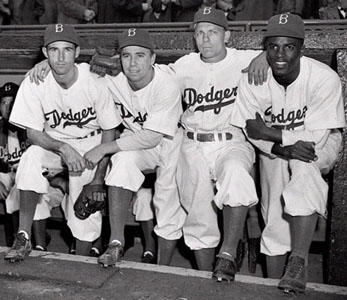
Dodgers infield: (L-R) Spider Jorgensen, Pee Wee Reese, Eddie Stanky, Jackie Robinson In the Junior Circuit, the Yankees returned to the top after a three-year drought.
- But these were not your 1936-39 Bronx Bombers who won four straight World Series. Other than Joe DiMaggio, the Yankees boasted no marquee players.
- And even DiMaggio was a question mark after a mediocre (for him) 1946, his first season after three years in the military. He hit .290, his first sub-.300 season. He also drove in fewer than 100 runs (95) for the first time in his career as the Yankees finished 3rd. Doctors told Joe he'd need surgery on his heel during the offseason, but he kept putting it off, hoping the pain would go away. (He would finally have the bone spurs removed in November 1948.)
- In 1947, DiMaggio reported to his first ML spring training in which Joe McCarthy was not his manager. New GM Larry MacPhail had axed Marse Joe after 35 games in '46. After tolerating two fill-in skippers for the rest of that season, MacPhail hired Bucky Harris for 1947. Calm, relaxed, and patient, Bucky won the esteem and affection of his players but always wondered where he stood with his general manager, who kept his hands in every aspect of the club's operation. As Joe Torre would do fifty years later with owner George Steinbrenner looking over his shoulder, Bucky kept his club focused on the field.
- The Yankee Clipper bounced back some in '47, increasing his batting average to .315 and his RBIs slightly to 97. But injuries to "Old Reliable" Tommy Henrich and Charlie Keller, two holdovers from the prewar championship teams, forced Bucky to use 22-year-old C Larry Berra in the RF, where he just tried to stay out of DiMaggio's way. Big Johnny Lindell played far more games in LF than Keller, who was injured in midseason, and hit. 275 with 67 RBIs.
- George McQuinn, a 37-year-old refugee from the Browns' '44 pennant winning squad, played 1B and was the surprise of the year, hitting a respectable .304. He had suffered the ultimate indignity of an outright release by the cellar-dwelling Philadelphia Athletics at the end of the 1946 season.
- Snuffy Stirnweiss and Phil Rizzuto formed a dependable double play combination and hit adequately (.256 and .273 respectively). 3B Billy Johnson contributed a solid .285 batting average and 95 RBI.
- Two newcomers greatly benefitted the pitching staff. 30-year-old Allie Reynolds came from Cleveland in a trade for 2B Joe Gordon to win 19 games. Rookie Frank "Spec" Shea led the league in winning % (.737) as a result of a 14-5 record. And southpaw Joe Page performed the same role for the Yanks that Casey did for the Dodgers. Starting only twice, Joe contributed 14 wins and 17 saves with a 2.48 ERA.
Page was known as a pitcher with "a great arm and a lousy head. He threw hard and hoped for the best, not knowing where the ball would go." (Jonathan Eig) Harris made two decisions regarding Page for 1947: he demoted him to the bullpen and made him DiMaggio's roommate. Trying to imitate Joe D helped Joe P focus more on and off the field. He still drank but wasn't such an ugly drunk anymore. In the process, Page gained much needed confidence.
- As the season hit its stride in mid-May, the Yanks rode in fifth place before moving up to second behind the Tigers through mid-June. A stretch in which NY won 12 of 14 catapulted them to the top before an American League-record 19 wins in a row (June 29-July 17) left the rest of the league in the dust. The Yanks never fell less than 10.5 games ahead to finish 97-57 and up 12.
- New York led the American League in batting average, home runs, and ERA.
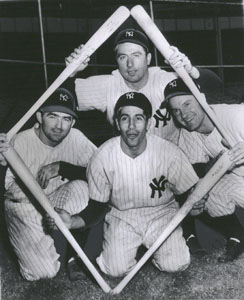
Yankee infield: Billy Johnson 3B, Phil Rizzuto SS (in middle), 2B Snuffy Stirnweiss, 1B George McQuinn |
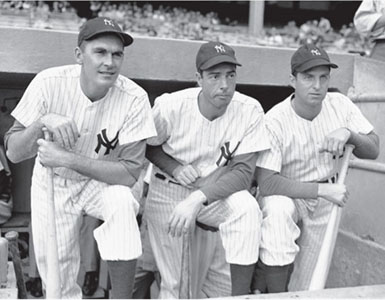
Yankees' outfield (L-R): Johnny Lindell LF, Joe DiMaggio CF, Tommy Henrich RF |
- MacPhail had become the Dodgers GM in 1938 when Rickey turned down the job and recommended Larry instead.
- With Leo Durocher as his manager, MacPhail transformed the lovable Bums into pennant winners by 1941, when they lost to the Yankees in five games.
- After the 1942 season, MacPhail left baseball for the Army. His successor was none other than Rickey, who had had enough of St. Louis owner Sam Breadon.
- When MacPhail got out of the army, he joined a group that purchased the Yankees before the 1946 season with the understanding that he would become the GM.
- Now Rickey and MacPhail were crosstown rivals. Unsuccessful in his efforts to lure Durocher to the Bronx, Larry at least struck a blow at Rickey by hiring two of his coaches, Charlie Dressen and Red Corriden. MacPhail also played a key role behind the scenes in convincing Chandler to suspend Durocher. Further, Larry had headed the Policy Committee that had recommended against signing black players.
- Now here were the rivals' two clubs meeting in the Fall Classic. With sedate Burt Shotton and easy-going Bucky Harris at the controls, any fireworks would have to come from the GMs.
1947 Brooklyn Dodgers
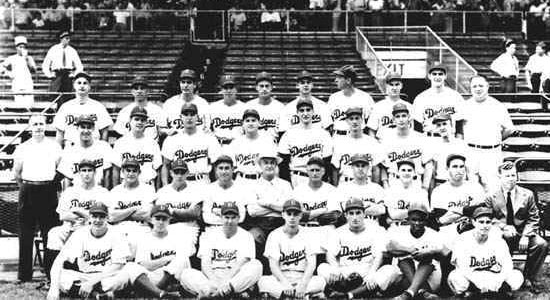
Experts agreed that the '47 contenders were the weakest to compete in a World Series in many years.
- To back up that assertion, the Associated Press's MLB All-Star team, published after the Series, included only one player from either team: DiMaggio.
- Oddsmakers, as well as the New York media, considered the Yankees prohibitive favorites with few believing the Series would go the distance. The main reason cited was the Yanks' superior pitching staff. Rud Rennie of the New York Herald Tribune wrote,The Yankees should win the World Series from the Dodgers in five games. With luck and good pitching, they may win in four straight and get it over with.
- Bucky Harris seemed to agree since he felt that his opening game starter, Spec Shea, as well as Bill Bevens, another righthander, would stop the Dodgers cold, which implied the Yankee skipper believed his team would win in fewer than seven games. You can say that we're not worrying about the Dodgers, said Harris. Let them worry about us. In particular, he wasn't concerned about the National League champs' vaunted bunting and running style that proved so successful against National League foes. Nobody has ever won by bunting, especially against a team that can hit away like we do. Always at ease with the press, Harris also said, If I have to do it, I'll use Page to finish every game.
- Reporters also learned that the Yanks had devised a plan to cope with Robinson, who alone stole more bases (29) than the entire Yankee team combined. First, they would not walk Jackie, making him hit his way on. And NY's experienced staff should be able to keep their composure when Robinson danced off first threatening to steal. When asked by a writer how he planned to deal with the National League Rookie of the Year, Berra, the first rookie backstop ever to work a Series opener for an American League club, said he didn't expect any problem since he had thrown out Robinson both times Jackie had tried to steal on him the year before in AAA. Of course, reporters promptly apprised Jackie of Yogi's remarks. Harris stood behind his young backstop. Yogi? He's my kid. He was when people were telling me he didn't even look like a Yankee last spring. Well, maybe he didn't then, and maybe he doesn't now. But he's going to catch every game for me. He's a kid liable to belt that ball out of sight and mind. They'll try to run on him, sure. But I bet he'll hit for more bases than he gives away.
When Robinson walked in his first AB of the Series, he promptly stole second, Berra's throw arriving late. Pee Wee Reese added two thefts in the first two games, leading Harris to start Sherman Lollar behind the plate in Game 3.
- On the other side, Shotton made an issue of Harris' failure to invite the Dodgers to practice in the Stadium at 1:30 the day before the opener. Instead, the Yankees worked out at that hour, depriving the Brooklynites of a chance to familiarize themselves with the shadows they would see at game time. The Dodgers did a slow burn over the snub, believed to be the first time in series history that the visiting club had been treated that way. Harris responded that he had received no request from the Dodgers to workout and added, We haven't asked for permission to work out in Ebbets Field, either.
- Shotton didn't seem concerned about the sore middle finger on C Bruce Edwards' throwing hand. Bruce took batting practice the day before the game and expected to play. The Dodgers didn't fear the Yankees trying to steal since speed on the base paths was not their forte.
Bragan: Bruce Edwards was our catcher. Every opposing player in the league knew about his bad arm, and every opposing player who tried to run on Bruce usually paid the price. Bruce's quickness in releasing the ball was phenomenal, and our pitchers excelled at keeping runners close.
- Five members of the Dodgers were veterans of the 1941 World Series, and four Yankees had also played in that classic.
Dodgers: Dixie Walker, Pete Reiser, Cookie Lavagetto, Pee Wee Reese, Hugh Casey
Yankees: Tommy Henrich, Joe DiMaggio, Phil Rizzuto, Spud Chandler
- NBC paid Major League Baseball $65,000 to carry the game over a small network that included stations in New York City, Washington, Philadelphia, and Schenectady NY. Sponsors were the Gillette Safety Razor Company and the Ford Motor Company. Three Big Apple TV stations shared game coverage. WNBT, Channel 4, carried the opening game; WABD, Channel 5, broadcast game two; WCBS, Channel 2, games three and four from Ebbets Field; WNBT handled game five; and WABD took games six and seven. Barrooms throughout the Big Apple bought small black-and-white TVs to attract patrons. President Harry Truman admitted that he'd try to watch in the White House when he had some free time.
- NBC also won the rights to the radio broadcasts of the games. Learning a lesson from Mutual's choice of announcers in 1946, NBC turned its microphone over to the voices of the two teams, Red Barber of the Dodgers and Mel Allen of the Yankees.
- Another first for the Series was the use of six umpires with one added down each foul line. Since 1939, each league had provided an extra umpire at each game should one of the Men in Blue be injured or take ill. Commissioner Chandler decided that, if two extras were being paid, they might as well work for their money.
- Every box and reserved seat in Yankee Stadium had been sold, as well as 7,000 standing room tickets, and 12,000 bleacher seats would go on sale at 8 AM. So a record crowd was expected.
- The teams in this "Subway Series" would need no travel days. Playing consecutive days would test the pitching depth of the two teams.
- The weatherman provided beautiful Fall afternoons for every game.
|
|
|
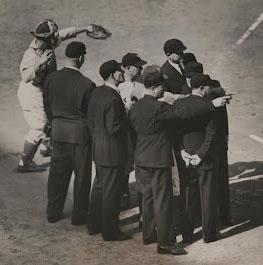
Six umpires go over ground rules at Ebbets Field
before Game 3 of 1947 World Series |
|
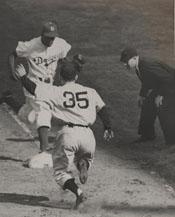
Robinson beats Berra to bag in Game 4; Yogi wore 35 his rookie season before switching to the now-retired 8 in 1948
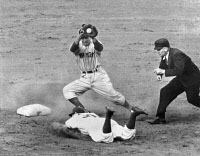
Al Gionfriddo steals 2B in 9th inning of Game 4
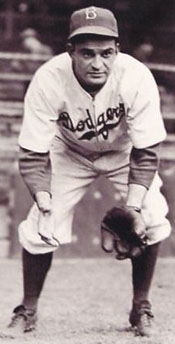
Cookie Lavagetto
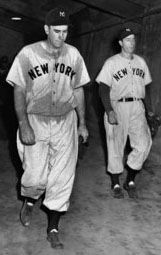
Bill Bevens walks to clubhouse after losing no-hitter in Game 4. Joe DiMaggio is at right.
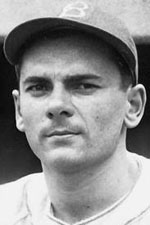
Vic Lombardi
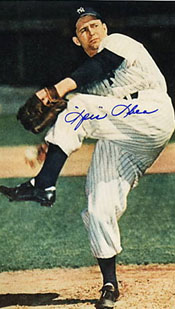
Frank Shea
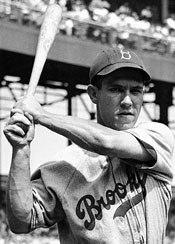
Pete Reiser

Hal Gregg
|
Series Results
- Tuesday, September 30 @ New York: Yankees 5 Dodgers 3
WP: Frank Shea; LP: Ralph Branca
- Wednesday, October 1 @ New York: Yankees 10 Dodgers 3
WP: Allie Reynolds; LP: Vic Lombardi
- Thursday, October 2 @ Brooklyn: Dodgers 9 Yankees 8
WP: Hugh Casey; LP: Bobo Newsom
- Friday, October 3 @ Brooklyn: Dodgers 3 Yankees 2
WP: Casey; LP: Bill Bevens
- Saturday, October 4 @ Brooklyn: Yankees 2 Dodgers 1
WP: Shea; LP: Rex Barney
- Sunday, October 5 @ New York: Dodgers 8 Yankees 6
WP: Branca; LP: Page
Joe DiMaggio and Tommy Henrich always said that the 1947 Series was the most exciting they had ever played in or seen. Many reporters agreed, although they also branded the Series one of the worst played.
- Game Four deserves (and will get) an article in its own right. Yankee righty Bill Bevens, only 7-13 for the season, had a no-hitter going with two outs in the ninth. But PH Cookie Lavagetto hit a double to plate the tying and winning runs.
- Game Six was another classic, highlighted by little used LF Al Gionfriddo's sensational catch of DiMaggio's mighty drive at the 415 mark in LCF to end the 6th with two men on. The game set three World Series records: largest attendance (74,065), longest nine inning game in Series history (3:19), and most players used (38 - 21 Yankees and 17 Dodgers).
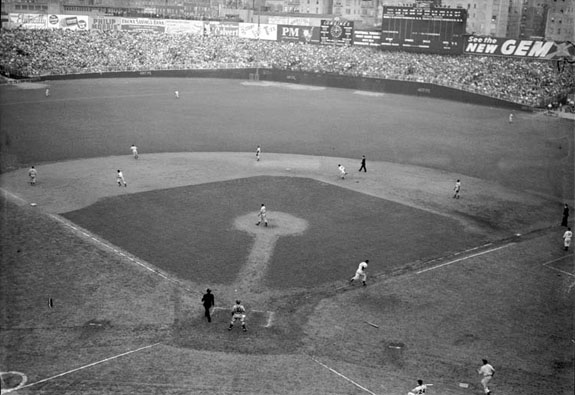
Game Six: DiMaggio runs to 1B as Al Gionfriddo in LF starts back for his epic catch.
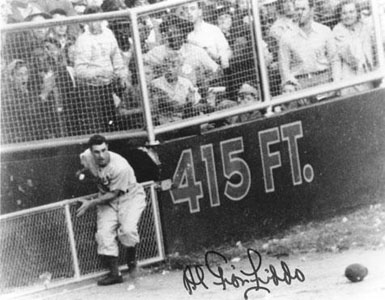
Gionfriddo right after snagging DiMaggio's drive at the bullpen gate.
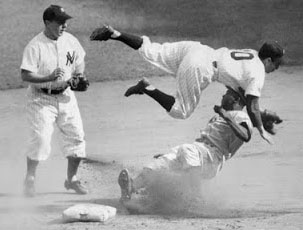 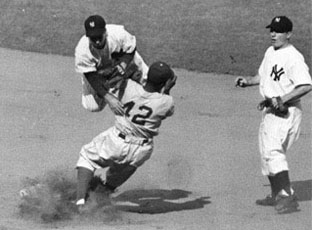
Two views of Jackie Robinson upending Phil Rizzuto in Game Six
Game 7: Monday, October 6 @ New York
Another throng was expected for the finale.
- In an unprecedented move, GM MacPhail had sold tickets in advance for the first, second, sixth, and seventh games at his Stadium. So all reserved and box seats were gone. 13,800 bleacher seats would be available the morning of the game for $1 and up to 10,000 standing-room-only tickets at $4 apiece.
- Despite the fact that the Dodgers had won three of the last four games, local bookies favored New York in Game Seven, 8 1/2 to 5. Yankee adherents who "took a bath" on Game Six when their team was heavily favored hoped to regain their losses.
Each manager needed to get one more effort from his overworked pitching staff.
- Both skippers were prepared to employ Pitching by Committee as the "There's No Tomorrow" contest proceeded.
- Shotton, who had used at least three pitchers in each of the six games, said, I have ten of 'em [pitchers], and I'll use 'em all if I need to. Ralph Branca and Vic Lombardi both came to me and said they were ready to go and wanted to work. That's why we can't be beat.
- Casey, who pitched the last two innings of Game 6, offered: I'll be ready to go all the way tomorrow if he wants me. I think we're going to win. Yes, I feel positive.
- Harris was expected to start Bevens on two days rest. However, he decided to go with Shea on only one day's rest with Bill first up in the bullpen.
According to Spec Shea's son, Harris held a team meeting to determine who would start Game 7. The only volunteer was Shea as the others all claimed sore arms or the need for rest. After a lengthy debate, Harris decided to go with Shea even though he had just pitched a complete game victory two days earlier in Game 5. Frank Jr. also claimed that the Yankee management promised his father a $1,000 bonus for making the start - a sum that Shea never received.
Spec
Shea grew up in Naugatuck LI as a Yankee fan. My father took me down to the Stadium when I was a kid, and this was when you could go on the field after the game. I used to run out to the mound and pretend I was pitching. "Someday," I'd say, "I'm going to pitch here." He is rarely mentioned in discussions of players who lost productive major league years to World War II but should be.
- The Yankees would play without LF Lindell, who had hit an even .500 (9-for-18) before fracturing a rib attempting to break up a double play in Game 6. So Bucky put Berra in right field and moved Henrich to the vaster expanse of left field. Harris was also concerned about Berra's ability to thwart the Dodgers' running game, especially Robinson. Aaron Robinson would be behind the plate for the final game.
- But the Bums would be short an outfielder also as oft-injured CF Pete Reiser suffered from what turned out to be a broken ankle.
- Burt decided to start Hal Gregg, who had twirled seven strong innings–only one run allowed–in Game Four. Gregg thus became the pitcher who started a seventh game with so few regular season wins (four) and so high an ERA (5.87). Burt told Hal to throw as hard as he could for as long as he could.
- The Dodgers sought their first World Series championship while the Yankees hoped to add an eleventh crown to their collection.
- In his office before the game, Harris seemed far from confident. They were mighty lucky we didn't beat them four straight, and it wouldn't surprise me any if we got licked.
The Game 7 crowd didn't quite match Sunday's record attendance but still numbered 71,548 on another gorgeous Fall afternoon. Fans in the Stadium or watching on TV who expected another dramatic game would instead see a business-like performance with no explosive moments like Lavagetto's hit or Gionfriddo's catch.
|
Brooklyn Lineup
| Eddie Stanky |
2B |
| Pee Wee Reese |
SS |
| Jackie Robinson |
1B |
| Dixie Walker |
RF |
| Gene Hermanski |
LF |
| Bruce Edwards |
C |
| Carl Furillo |
CF |
| Spider Jorgensen |
3B |
| Hal Gregg |
P |
|
 |
 |
New York Lineup
| Snuffy Stirnweiss |
2B |
| Tommy Henrich |
LF |
| Yogi Berra |
RF |
| Joe DiMaggio |
CF |
| George McQuinn |
1B |
| Billy Johnson |
3B |
| Aaron Robinson |
C |
| Phil Rizzuto |
SS |
| Spec Shea |
P |
|
|
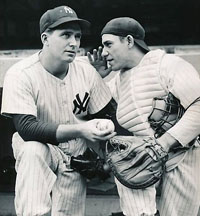
Spec Shea and Yogi Berra
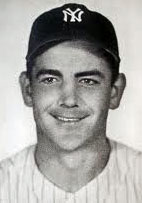
Aaron Robinson
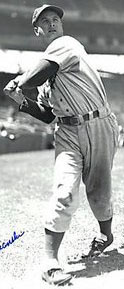
Gene Hermanski
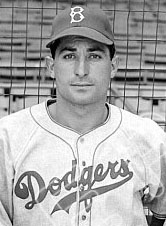
Carl Furillo
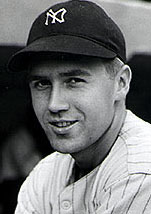
Bobby Brown
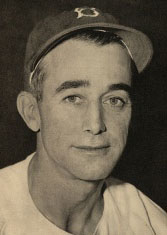
Clyde Sukeforth
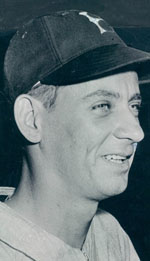
Hank Behrman
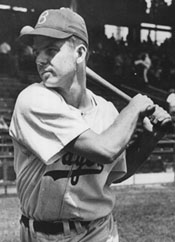
Eddie Miksis
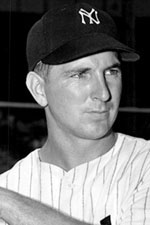
Allie Clark
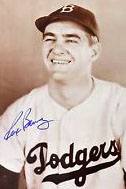
Rex Barney
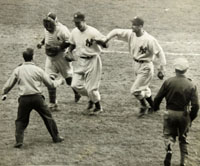
Page leaves mound triumphant.
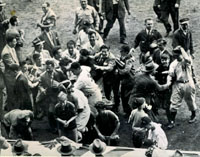
Fans swarm their heroes in front of Yankee dugout.
|
1st inning
- The Dodgers came out aggressively against Shea, who had held them to two runs in 14 innings in Games 1 and 5.
After falling behind 0-2, then taking a ball, 2B Eddie Stanky singled to RF.
Shotton gave the hit-and-run sign on the first pitch to SS Pee Wee Reese. Stanky took off with the delivered, but Reese swung and missed. C Aaron Robinson, much more polished behind the plate than Berra, gunned down Stanky, Stirnweiss making the tag.
Reese hardly ever swung at the first pitch. Bragan: Everybody knew this. Opposing pitchers could assure themselves of at least one strike by just tossing that first offering straight down the middle. In the dugout before many at-bats, Pee Wee would promise us, "I'm going to hit the first pitch this time." But he rarely did.
Reese, who led the Dodgers in Series hits with seven, walked.
1B Jackie Robinson, the third straight right-handed batter, lined to left field where Henrich, in an unfamiliar position, partially misjudged the ball but made a reaching catch.
Now came another sign that the fates would not be with the underdog Dodgers today. RF Dixie Walker got hold of a Shea pitch and smacked into into the lower right field stands just barely foul. Reese then repeated Stanky's feat of getting caught stealing by C Robinson, this time SS Phil Rizzuto taking the throw. Second-guessers had a field day questioning why Harris hadn't started Aaron behind the dish in the first two games.
- Gregg started strong.
2B Snuffy Stirnweiss lifted an easy fly to RF Walker.
Henrich, who had nine hits in the first six games, skied to Gene Hermanski in short left.
Berra, just 3-for-16 in the Series, rapped sharply to 1B Robinson, who tossed to Gregg covering first.
2nd inning
- If Yankee fans suspected Shea wasn't in top form after the first inning, the next frame removed all doubt. It turned out that Spec battled a blister on the middle finger of his pitching hand.
Returning to the plate, Walker fouled the first pitch to 1B George McQuinn.
Hermanski crashed a liner into the rightfield corner, and when the ball came off the low wall at a weird angle, Berra couldn't come up with it. So Gene kept going around second base and slid head first into third just ahead of Yogi's throw.
C Bruce Edwards singled over third base, scoring Hermanski.
CF Carl Furillo singled through the middle, Edwards stopping at 2B.
Deciding that his gamble starting Shea wasn't working, manager Harris called for Bevens, whom he originally announced as his starter.
Home plate umpire Ed Rommel, at the request of Dodger coach Jake Pitler, instructed umpires Larry Goetz and Bill McGowan, Ed's colleagues at first and second base respectively, to watch Bevens' pitching stance in relation to the rubber.
After lining one foul down the right field line, 3B Spider Jorgensen bounced a ground-rule double into the lower right field stands. Edwards scored, but Furillo had to stop at third.
P Gregg bounded to Rizzuto, who threw out Furillo at the plate, Jorgensen taking third. A voice in the press box asked: Is Charlie Dressen still coaching at third? No, it was Ray Blades who foolishly sent Carl home. Little did the Dodgers know that Furillo's futile slide was the closest they would come to a run the rest of the game.
Stanky popped to Rizzuto in short left field.
Dodgers 2 Yankees 0
- CF Joe DiMaggio flied to Furillo.
McQuinn walked on a 3-2 pitch that was high and outside.
3B Billy Johnson popped to Stanky in short right field.
Gregg walked C Robinson, McQuinn moving to second.
Rizzuto caromed a single off third base, which just missed Jorgensen's diving clutch into left field. McQuinn scored, and Robinson stopped at second.
Bevens looked at a third strike.
Dodgers 2 Yankees 1
3rd inning
- Reese fanned on four pitches.
Robinson also struck out.
Walker got a free pass on five pitches.
Hermanski lined to 3B Johnson.
- Gregg walked Stirnweiss on four pitches.
Henrich lifted a fly to Walker in short right-centerfield.
Berra flied to Furillo.
DiMaggio hit the first pitch deep to left field where Hermanski took it in.
4th inning
- Edwards duplicated his 2nd inning hit when he shot a single past Johnson down the left field line.
Furillo popped to Stirnweiss back of second base.
Snuffy raced into short right field near the foul line to pull down Jorgensen's fly.
Gregg went out on an easy 4-3 grounder.
Few noticed that Bevens grabbed at his right shoulder as he left the mound.
- McQuinn looked at a third strike.
Johnson walked on five pitches.
Umpire Rommel called out A. Robinson, who protested the third strike call.
Rizzuto singled to left field, Johnson stopping at second base.
Harris sent Bobby Brown up to hit for Bevens.
The Dodgers had yet to retire him in three previous pinch-hit appearances: a walk in Game 1, double in Game 3, and single in Game 6. The Tulane University medical student who roomed with Yogi Berra on the road would return to New Orleans the next day to resume his studies.
He ran the count to 3-1, then doubled to left, sending Johnson home with the tying run and sending Rizzuto to third. Brown's name went into the record books as the first to deliver three pinch-hits in one Series.
In the Dodger dugout, Shotton told coach Clyde Sukeforth, "Go get him." So Hank Behrman with a 5.48 ERA in 40 games replaced Gregg.
Rickey had traded Behrman to the Pirates on May 3, but Pittsburgh returned him to Brooklyn June 14.
Hank proceeded to walk Stirnweiss on four pitches, filling the bases.
Probably figuring Behrman would groove one to get a strike, Henrich smacked the first pitch into right field, scoring Rizzuto.
It was the third time in Series that Tommy had driven in the go-ahead run.
With the bags still full, Robinson made a marvelous one-handed stop of Berra's grounder and hurried a throw to Behrman covering first.
Henrich on Bevens lasting only 2 2/3 innings: Shea tried to come back on only two days of rest for his third start of the Series, but he didn't have it. ... Trouble comes as no great surprise when a pitcher tries to pitch his third game in only seven under the constant tension of the World Series, but what did surprise us was that Bevens couldn't help us either. He couldn't get his arm loose after his Superman performance of three days before.
Yankees 3 Dodgers 2
5th inning
- Harris went right back to Page the day after Joe blew Game 6, giving up four runs in the 6th inning. Since, in his own words, they hit the tar out of my curve yesterday, Joe decided to throw primarily fastballs, by far his best pitch.
Red Barber told this story about Harris's selection of Page: Harris rang the [bullpen] phone and [bullpen coach Johnny] Schulte got on. Harris asked about Page. Schulte said, "He ain't got nothing." Harris said, "I don't care what he ain't got ... send in Joe Page."
Henrich added this to the story: Larry MacPhail was hiding on the steps leading to the dugout; he couldn't stand the excitement in his mezzanine seat. He said later he knew what Bucky was thinking: that Page was the man he wanted. Now they were telling him that Page had nothing. MacPhail said Harris turned to him and said, "Well, it means as much to you as it does to me." Larry said he shrugged his shoulders, telling Harris it was his decision. Then Bucky turned to Crosetti and said, "Give me Page."
Stanky bounced to second.
Reese flied to Berra.
J. Robinson lined to Henrich deep in left field.
- Behrman walked DiMaggio.
McQuinn sacrified, Jorgensen to Stanky, who covered first.
Stanky threw out Johnson, DiMaggio taking third.
A. Robinson flied to Walker near the lower stand in the right-field corner.
6th inning
- Page picked up where he left off the previous inning.
Walker flied to center.
Eddie Miksis, a right-handed batter, replaced the left-handed hitting Hermanski. Miksis tried to bunt but went down 5-3.
Edwards skied to DiMaggio.
- Miksis took over left field for Hermanski.
Rizzuto beat out a bunt near the pitcher's mound for his third straight one-base hit.
As Page missed a second stab at a bunt, Phil stole second.
Page struck out.
Stirnweiss took ball four on a 3-1 pitch.
Out came Sukeforth again, and in came lefty Joe Hatten to face lefthand-hitting Henrich.
Tommy protested after being called out on a half-swing for strike three.
Allie Clark pinch-hit for Berra to create a lefty-righty matchup and singled to center, plating Rizzuto. Stirnweiss stopped at second.
Not wanting Hatten to face DiMaggio, Shotton called on Rex Barney as his fourth pitcher.
DiMaggio flied deep to Furillo in centerfield.
Yankees 4 Dodgers 2
7th inning
- Clark provided a defensive upgrade in right field.
Furillo fouled to 1B McQuinn.
Cookie Lavagetto, the hero of Game 4, swung for Jorgensen and popped to second.
Gil Hodges batted for Barney and fanned.
Page had now retired nine in a row.
- Hugh Casey made his sixth appearance in the Series. Lavagetto went in to play third base.
Reese threw out McQuinn.
Bragan: Casey was the coolest customer I ever met. It seemed that nothing ever bothered him. ... the game stuation didn't exist where Casey was scared about coming in to pitch. ... Casey also liked to play mind games on the hitter. He'd shake off signs one after another just to make the batter wonder what the hell he was finally going to throw. Often Casey would be shaking his head before his catcher put the first sign down. ... Hugh Casey was not a fine physical specimen. He was always overweight, and not what we used to call "hard" fat, either. He had no muscle tone, yet could move quickly and fielded his position as well as any pitcher in the National League.
Johnson hit a high drive to left-centerfield. Miksis, a utility infielder playing the most notorious sun field in baseball, turned the wrong way and the ball sailed over his left shoulder for a triple. Johnson's clout was his third triple of the Classic, another new mark.
If they hadn't asked the question the previous inning, Dodgers fans certainly wondered now why Shotton hadn't put Gionfriddo in left field after his miraculous catch of Game 6. Apparently, with his team behind, Burt wanted a right-handed batter in the #5 hole in his lineup against the southpaw Page.
A. Robinson flied to Miksis, Johnson scoring easily after the catch with the first run Casey had allowed in the Fall Classic.
Rizzuto popped to Stanky in short center.
Yankees 5 Dodgers 2
8th inning
- With a three-run lead now, Page continued to mow down the Dodgers.
Stanky flied to Clark.
So did Reese.
Robinson also hit a fly but to DiMaggio.
- With Harris giving no thought to a pinch-hitter, Page grounded to Robinson unassisted.
Stirnweiss popped to Furillo.
Henrich skied to Miksis.
9th inning
- Walker tapped the first pitch to Stirnweiss, who tossed him out .
Miksis singled to center to end Page's string of 13 in a row retired. The Dodgers now had the same number of hits as the Yanks, seven.
Edwards banged a tailor-made double play ball to Rizzuto, who tossed to Stirnweiss, who relayed to McQuinn. Just like that, the Yanks were world champs again.
Bruce remains the only player to end the seventh game of a World Series by grounding into a double play.
FINAL SCORE: YANKEES 5 DODGERS 2
The official scorer credited the victory to Page, who faced just 15 batters in five innings.
|
Postgame
Reporters found an unexpected story awaiting them in the Yankees' clubhouse.
- 59-year-old GM MacPhail managed to grab the headlines and upstage his triumphant manager by announcing his retirement as president of the club at the very moment his players came thundering into their dressing room to celebrate the final triumph.
Too nervous to stay in his box, MacPhail had gone to the pressroom to sweat out the rest of the game. Many extra reporters were gathered there for Game 7. As soon as the game-ending double play was recorded, Larry screamed, That's it! That does it. That's my retirement! Tears streamed down his face. Abandoning plans to go to one of the clubhouses, the writers gathered around MacPhail, who told them his health couldn't stand the pressure of running the Yankees. I've got what I wanted (the world championship) ... I'm through. Seeing General Manager Weiss come in, Larry threw his arm around George's shoulder and shouted to the writers, I want you to say this in your story. I built the losing team out there (the Dodgers), but he's the guy who built the winners.
- Harris enjoyed his second World Series crown as a manager after leading the Senators to the 1924 title. If that wasn't the greatest series, it will do until a better one comes along. Whew! I'm glad it's over and proud of my club. The players deserve all the praise you can heap upon them. I honestly thought the way we started, we'd win it in four straight - and we would have with a couple of breaks. ... Shea wasn't quite ready. Bevens hurt his arm in the fourth. But that Page! The way he took over was a revelation. Here's to Joe Page (raising his glass). He admitted that he had been tinkering with the notion of starting Page. And if I hadn't had to use him in the sixth game, I'd have done it.
- DiMaggio: What a way to win. That man Page. What a pitcher when the chips are down. Was he great!
- Perhaps the happiest Yankee was Page. I'm just about the happiest guy in the world. This makes up for everything, particularly that cuffing they gave me yesterday. They had their fun then. I had mine today. I had it, and they didn't. I really poured it on. I threw one slider. That went to Walker. I threw one curve. Hodges hit that one foul into the stands. All the rest were fast balls.
- Shotton was unbowed in defeat. I'm sorry we didn't win it, but I have no regrets. A better club beat us this time but I'll tell you this: We'll beat the Yankees during the next ten years a whale of a lot more times they they will beat us. The Dodger skipper asked reporters to relay his congratulations to the Yankees. When you get beaten by Bucky Harris, you have lost to a good guy and good manager.
- Burt reported on General Manager Rickey's visit with the team when they first entered the clubhouse after the game. Rick told the boys that they were and are the best club in the league and that they mustn't feel downhearted because they lost the series. Ford Frick said pretty much the same sort of thing after he came in.
- Burt told Gregg: You've been doing a great job, Hal. You don't have anything to feel badly about. You did a good job in the series, and you don't have to go back home fretting about anything. But Gregg wasn't happy. I couldn't get the ball over when I needed to.
- When Commissioner Chandler entered the Dodger locker room, Negro photographers asked him to pose with the two African-American Dodgers, Robinson and P Dan Bankhead.
- Numerous Dodgers went to Jackie's locker to shake his hand and congratulate him for his grounbreaking rookie season. Robinson had little to say to reporters. We lost. We got no alibis. We'll get them next year.
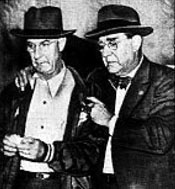 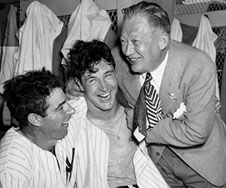 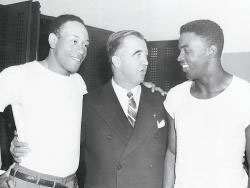
L: Dodgers GM Branch Rickey console his old friend Burt Shotton after Game 7.
M: Yankees GM Larry MacPhail rejoices with DiMaggio and Joe Page
R: Dan Bankhead and Jackie Robinson pose with Commissioner Happy Chandler
The Series set a total attendance record of 389,763.
- Naturally, there was also a new high in gross receipts of $2,137,549, almost $4 million over the previous maximum.
- The Yankees enjoyed $5,830 each as their share while the Dodgers received $4,081 per man.
As an example of why players coveted the Series money, Yogi Berra's salary for 1947 was $5,000. So he earned that much and $830 more just for the Fall Classic.
The Dodgers showed their loyalty to Leo Durocher by voting him a full share of the Series money. However, Commissioner Chandler stepped in and negated that vote, saying it wasn't in the best interests of baseball.
Follow-up
Two of the Dodger heroes of the 1947 World Series never played another major league game.
- Brooklyn sent Al Gionfriddo to their AAA farm club in Montreal for the 1948 season, and he never made it back to the Big Show.
- Cookie Lavagetto returned to his hometown to play for the Oakland Oaks under Casey Stengel. Cookie coached for Brooklyn 1951-53 under Charlie Dressen. Lavagetto also served on Dressen's staff with the Senators in 1955-56 before replacing his mentor early in the '57 season.
Bucky Harris was named Manager of the Year in the American League.
- But a year later, when the Yankees finished third with a 94-60 record, he was let go.
- His replacement was Casey Stengel, who had managed major league teams to a winning record only once in nine seasons.
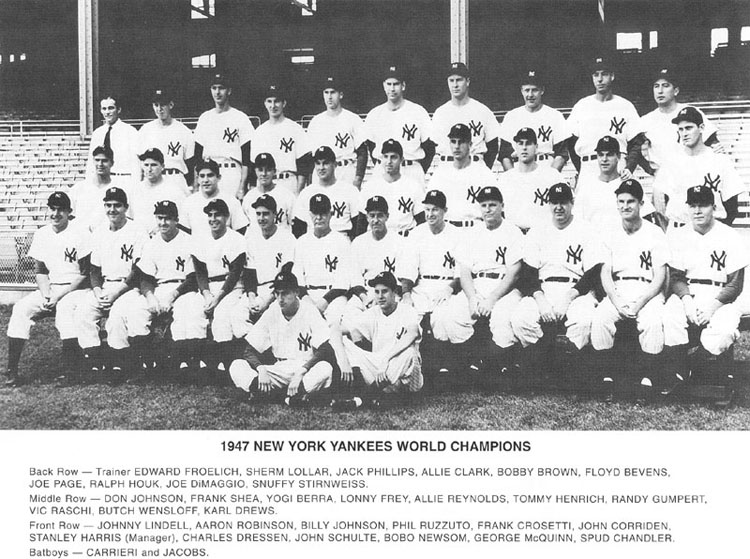
References: The World Series, David S. Neft & Richard M. Cohen (1990)
1947: When All Hell Broke Loose in Baseball, Red Barber (1982)
You Can't Hit the Ball with the Bat on Your Shoulder, Bobby Bragan as told to Jeff Guinn (1992)
The Seventh Game, Barry Levenson (2004)
Opening Day: The Story of Jackie Robinson's First Season, Jonathan Eig 2007)
Yogi Berra, Eternal Yankee, Allen Barra (2009)
|
|




















 Yankee infield: Billy Johnson 3B, Phil Rizzuto SS (in middle), 2B Snuffy Stirnweiss, 1B George McQuinn
Yankee infield: Billy Johnson 3B, Phil Rizzuto SS (in middle), 2B Snuffy Stirnweiss, 1B George McQuinn

